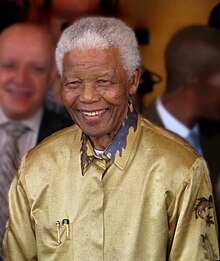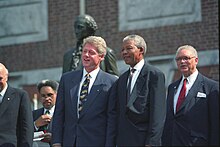下面为大家整理和介绍的是关于首任南非黑人总统曼德拉Nelson Mandela的SAT写作经典例子,这篇SAT写作例子的重要内容回顾了曼德拉的政治生涯以及和种族制度作斗争的历程以及他受到的评价等等。以下是作文的详细内容:

Mandela in 2008
President of South Africa
In office 10 May 1994 – 14 June 1999 2 September 1998 – 14 June 1999
Born:Rolihlahla Mandela(1918-07-18) 18 July 1918 (age 93) Mvezo, South Africa
Nationality:South African
Political party:African National Congress
Spouse(s):Evelyn Ntoko Mase (1944–1957)
Winnie Madikizela (1957–1996)
Gra a Machel (1998–present)
Children:6
Residence:Houghton Estate, Johannesburg, Gauteng, South Africa
Alma mater:University of Fort Hare University of London External System University of South Africa University of the Witwatersrand
Religion:Methodism
Website:http://www.nelsonmandela.org/
Nelson Rolihlahla Mandela (Xhosa pronunciation: [xo li a a man de la]; born 18 July 1918) is a South African politician who served as President of South Africa from 1994 to 1999, the first ever to be elected in a fully representative democratic election. Before being elected President, Mandela was a militant anti-apartheid activist, and the leader and co-founder of Umkhonto we Sizwe, the armed wing of the African National Congress (ANC). In 1962 he was arrested and convicted of sabotage and other charges, and sentenced to life. Mandela went on to serve 27 years in prison, spending many of these years on Robben Island. Following his release from prison on 11 February 1990, Mandela led his party in the negotiations that led to the establishment of democracy in 1994. As President, he frequently gave priority to reconciliation, while introducing policies aimed at combating poverty and inequality in South Africa.
In South Africa, Mandela is often known as Madiba, his Xhosa clan name; or as tata (Xhosa: father). Mandela has received more than 250 awards over four decades.
Early life
Nelson Mandela belongs to a cadet branch of the Thembu dynasty, which reigns in the Transkei region of South Africa's Eastern Cape Province. He was born in Mvezo, a small village located in the district of Umtata. He has Khoisan ancestry on his mother's side. His patrilineal great-grandfather Ngubengcuka (who died in 1832), ruled as the Inkosi Enkhulu, or king, of the Thembu people. One of the king's sons, named Mandela, became Nelson's grandfather and the source of his surname. However, because he was only the Inkosi's child by a wife of the Ixhiba clan (the so-called "Left-Hand House"), the descendants of his branch of the royal family were not eligible to succeed to the Thembu throne.

Nelson Mandela circa 1937
Political activity
After the 1948 election victory of the Afrikaner-dominated National Party, which supported the apartheid policy of racial segregation, Mandela began actively participating in politics. He led prominently in the ANC's 1952 Defiance Campaign and the 1955 Congress of the People, whose adoption of the Freedom Charter provided the fundamental basis of the anti-apartheid cause. During this time, Mandela and fellow lawyer Oliver Tambo operated the law firm of Mandela and Tambo, providing free or low-cost legal counsel to many blacks who lacked attorney representation.
Mahatma Gandhi influenced Mandela's approach, and subsequently the methods of succeeding generations of South African anti-apartheid activists. (Mandela later took part in the 29–30 January 2007 conference in New Delhi marking the 100th anniversary of Gandhi's introduction of satyagraha (non-violent resistance) in South Africa).
Armed anti-apartheid activities
In 1961 Mandela became leader of the ANC's armed wing, Umkhonto we Sizwe (translated Spear of the Nation, and also abbreviated MK), which he co-founded. He coordinated sabotage campaigns against military and government targets, making plans for a possible guerrilla war if the sabotage failed to end apartheid. Mandela also raised funds for MK abroad and arranged for paramilitary training of the group.
Fellow ANC member Wolfie Kodesh explains the bombing campaign led by Mandela: "When we knew that we [sic] going to start on 16 December 1961, to blast the symbolic places of apartheid, like pass offices, native magistrates courts, and things like that ... post offices and ... the government offices. But we were to do it in such a way that nobody would be hurt, nobody would get killed." Mandela said of Wolfie: "His knowledge of warfare and his first hand battle experience were extremely helpful to me."
Later, mostly in the 1980s, MK, the organisation co-founded by Mandela, waged a guerrilla war against the apartheid government in which many civilians became casualties.. For example, the Church Street bomb in Pretoria killed 19 people and injured 217. After he had become President, Mandela later admitted that the ANC, in its struggle against apartheid, also violated human rights, criticising those in his own party who attempted to remove statements mentioning this from the reports of the Truth and Reconciliation Commission.
Until July 2008 Mandela and ANC party members were barred from entering the United States—except to visit the United Nations headquarters in Manhattan—without a special waiver from the US Secretary of State, because of their South African apartheid government era designation as terrorists.
Arrest and Rivonia trial
On 5 August 1962 Mandela was arrested after living on the run for seventeen months, and was imprisoned in the Johannesburg Fort. The arrest was made possible because the U.S. Central Intelligence Agency (CIA) allegedly tipped off the security police as to Mandela's whereabouts and disguise. Three days later, the charges of leading workers to strike in 1961 and leaving the country illegally were read to him during a court appearance. On 25 October 1962, Mandela was sentenced to five years in prison.
While Mandela was imprisoned, police arrested prominent ANC leaders on 11 July 1963, at Liliesleaf Farm, Rivonia, north of Johannesburg. Mandela was brought in, and at the Rivonia Trial they were charged by the chief prosecutor Dr. Percy Yutar with four charges of the capital crimes of sabotage (which Mandela admitted) and crimes which were equivalent to treason, but easier for the government to prove. They were also charged with plotting a foreign invasion of South Africa, which Mandela denied. The specifics of the charges to which Mandela admitted complicity involved conspiring with the African National Congress and South African Communist Party to the use of explosives to destroy water, electrical, and gas utilities in the Republic of South Africa.
Imprisonment
Mandela was imprisoned on Robben Island where he remained for the next eighteen of his twenty-seven years in prison. While in jail, his reputation grew and he became widely known as the most significant black leader in South Africa. On the island, he and others performed hard labour in a lime quarry. Prison conditions were very basic. Prisoners were segregated by race, with black prisoners receiving the fewest rations. Political prisoners were kept separate from ordinary criminals and received fewer privileges. Mandela describes how, as a D-group prisoner (the lowest classification) he was allowed one visitor and one letter every six months Letters, when they came, were often delayed for long periods and made unreadable by the prison censors.
On the day of his release, Mandela said his main focus was to bring peace to the black majority and give them the right to vote in both national and local elections.
Negotiations
Following his release from prison, Mandela returned to the leadership of the ANC and, between 1990 and 1994, led the party in the multi-party negotiations that led to the country's first multi-racial elections.

Mandela meeting with US President Bill Clinton in 1993
Presidency of South Africa
South Africa's first multi-racial elections in which full enfranchisement was granted were held on 27 April 1994. The ANC won 62% of the votes in the election, and Mandela, as leader of the ANC, was inaugurated on 10 May 1994 as the country's first black President, with the National Party's de Klerk as his first deputy and Thabo Mbeki as the second in the Government of National Unity. As President from May 1994 until June 1999, Mandela presided over the transition from minority rule and apartheid, winning international respect for his advocacy of national and international reconciliation. Mandela encouraged black South Africans to get behind the previously hated Springboks (the South African national rugby team) as South Africa hosted the 1995 Rugby World Cup. After the Springboks won an epic final over New Zealand, Mandela presented the trophy to captain Francois Pienaar, an Afrikaner, wearing a Springbok shirt with Pienaar's own number 6 on the back. This was widely seen as a major step in the reconciliation of white and black South Africans.
After assuming the presidency, one of Mandela's trademarks was his use of Batik shirts, known as "Madiba shirts", even on formal occasions. In South Africa's first post-apartheid military operation, Mandela ordered troops into Lesotho in September 1998 to protect the government of Prime Minister Pakalitha Mosisili. This came after a disputed election prompted fierce opposition threatening the unstable government. Commentators and critics including AIDS activists such as Edwin Cameron have criticised Mandela for his government's ineffectiveness in stemming the AIDS crisis. After his retirement, Mandela admitted that he may have failed his country by not paying more attention to the HIV/AIDS epidemic. Mandela has since spoken out on several occasions about the AIDS epidemic.
Retirement
Mandela became the oldest elected President of South Africa when he took office at the age of 75 in 1994. He decided not to stand for a second term and retired in 1999, to be succeeded by Thabo Mbeki.
After his retirement as President, Mandela went on to become an advocate for a variety of social and human rights organisations. He has expressed his support for the international Make Poverty History movement of which the ONE Campaign is a part. The Nelson Mandela Invitational charity golf tournament, hosted by Gary Player, has raised over twenty million rand for children's charities since its inception in 2000. This annual special event has become South Africa's most successful charitable sports gathering and benefits both the Nelson Mandela Children's Fund and Gary Player Foundation equally for various children's causes around the world.
Acclaim
Eve Fairbanks of Newsweek said "Mandela rightly occupies an untouched place in the South African imagination. He's the national liberator, the saviour, its Washington and Lincoln rolled into one".
In November 2009, the United Nations General Assembly announced that Mandela's birthday, 18 July, is to be known as "Mandela Day" to mark his contribution to world freedom.
Orders and decorations
Mandela has received many South African, foreign and international honours, including the Nobel Peace Prize in 1993 (which was shared with Frederik Willem de Klerk),[192] the Order of Merit from, and creation as, a Baliff Grand Cross of the Order of St. John by Queen Elizabeth II and the Presidential Medal of Freedom from George W. Bush. In July 2004, the city of Johannesburg bestowed its highest honour on Mandela by granting him the freedom of the city at a ceremony in Orlando, Soweto.
As an example of his popular foreign acclaim, during his tour of Canada in 1998, 45,000 school children greeted him with adulation at a speaking engagement in the SkyDome in the city of Toronto. In 2001, he was the first living person to be made an honorary Canadian citizen (the only previous recipient, Raoul Wallenberg, was awarded honorary citizenship posthumously). While in Canada, he was also made an honorary Companion of the Order of Canada, one of the few foreigners to receive the honour.
In 1990 he received the Bharat Ratna Award from the government of India and also received the last ever Lenin Peace Prize from the Soviet Union. In 1992 he was awarded the Atatürk Peace Award by Turkey. He refused the award citing human rights violations committed by Turkey at the time, but later accepted the award in 1999. In 1992 he received of Nishan-e-Pakistan, the highest civil service award of Pakistan.
纳尔逊·罗利赫拉赫拉·曼德拉(Nelson Rolihlahla Mandela)是享誉全球的诺贝尔和平奖得主。为了推翻南非白人种族主义统治,他进行了长达50年(1944—1994年)艰苦卓绝的斗争,铁窗面壁27年(1962—1990年)。最终,从阶下囚一跃成为南非第一任黑人总统,为新南非开创了一个民主统一的局面。
以上就是关于曼德拉的SAT经典写作例子的全部内容,后面附有非常简短的汉语背景介绍。大家可以在备考自己的SAT写作考试的时候,参考不同的话题,从不同的切入点进行准备,以便使例子更加贴合于文章的内容。